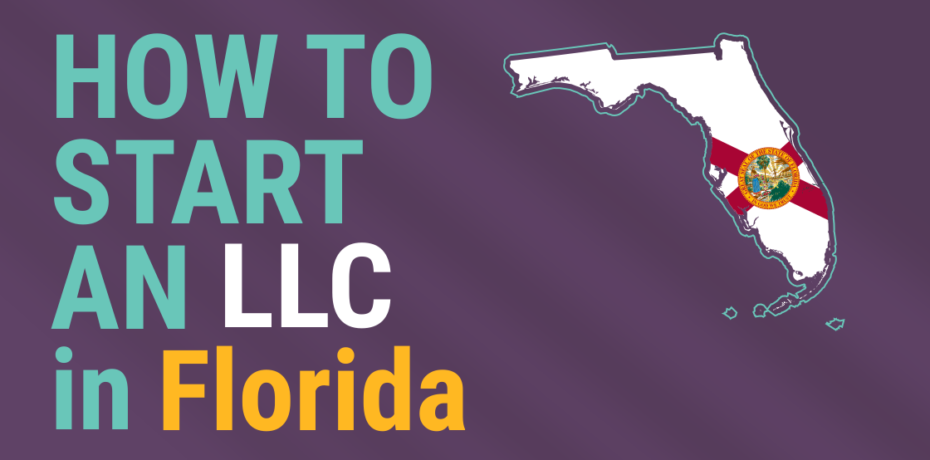Florida, also known as the Sunshine State, has a lot to offer business owners. Settling in Florida means enjoying its beautiful beaches, vibrant culture, and warm weather. But from a business point of view, it is a gold mine. With no state income tax, a growing economy, and a diverse population, Florida offers numerous advantages for business owners.
Statistics show that a Limited Liability Company is the most popular business structure in Florida. Over 2 million active L.L.C.s are currently operating in the state. This preference for L.L.C.s highlights the benefits of limited liability protection, tax flexibility, and ease of management that this business structure provides.
If you’re looking to take advantage of Florida’s business-friendly environment, starting an L.L.C. is a great choice. This guide will walk you through the steps of forming an L.L.C. in Florida, ensuring you have all the information needed to set up your business successfully. This blog will also give me inside information and tips to help your business join the ranks of the many thriving L.L.C.s in the Sunshine State.
How to Start an LLC in Florida
Step 1: Choose a Name
Choosing a name for your L.L.C. is a crucial first step. The name should reflect your brand and be unique enough to distinguish your business from others. Like many other U.S. states, Florida has defined a list of regulations that you must follow. These include:
- The name must include “Limited Liability Company,” “L.L.C.,“ or “L.L.C.”
- The name must be distinguishable from any existing business name registered with the Florida Division of Corporations.
- The name cannot contain words that might confuse your L.L.C. with a government agency (e.g., F.B.I., Treasury, State Department).
- Certain words (e.g., Bank, Attorney, University) may require additional paperwork and licensing requirements.
To ensure your chosen name isn’t already in use, you can check its availability through the Florida Division of Corporations Corporations’ online database. This simple search helps avoid any legal issues and ensures your business stands out.
Tips for Choosing Your Florida LLC Name
Choosing the right name for your L.L.C. is essential for establishing your brand identity and attracting customers. A good name should reflect your business’s mission, values, or services while being simple, memorable, and easy to spell and pronounce. Avoid using trendy terms that might quickly become outdated; instead, opt for a timeless name that will remain relevant as your business grows. Additionally, ensure the name you choose has an available domain for your website, which is crucial for establishing an online presence. Lastly, think about future expansion; pick a name that can accommodate potential new products or services without sounding restrictive.
Registering a Fictitious Name
If you plan to operate your L.L.C. under a different name from its legal name, registering a fictitious name, also known as a “doing business as“ (D.B.A.) name, is necessary. To start, check the availability of your desired fictitious name using the Florida Division of Corporations Corporations’ online database. Once you’ve confirmed the name is available, you can file the Fictitious Name Registration form online or by mail for a $50 fee. Unlike some states, Florida does not require you to publish your fictitious name in a newspaper, simplifying the process. Remember, fictitious names must be renewed every five years. Registering a D.B.A. allows you to legally operate under a name that aligns better with your branding and marketing needs while retaining the legal benefits of your L.L.C.
Step 2: Appoint a Registered Agent
Appointing a registered agent is a mandatory step when forming an L.L.C. in Florida. A registered agent is an individual or business entity designated to receive legal documents, government correspondence, and official notices on behalf of your L.L.C. The registered agent must have a physical street address in Florida (P.O. boxes are not acceptable) and be available during regular business hours to accept important documents.
You can act as your registered agent, appoint a trusted individual, or hire a professional registered agent service. Many businesses opt for professional services to ensure consistent availability and compliance.
Step 3: File the Articles of Organization
To officially form your L.L.C. in Florida, you need to file the Articles of Organization with the Florida Division of Corporations. This document provides the state with essential information about your L.L.C. Here’s what you need:
- The official name of your L.L.C., including the “L.L.C.” or “L.L.C.” designation.
- The physical address where your L.L.C. is primarily located. This is also known as the principal office address.
- If different from the principal office address, provide a mailing address.
- The name and physical address of your registered agent.
- The names and addresses of the L.L.C.’s members or managers, depending on the management structure.
You can file the Articles of Organization online or by mail. The filing fee is $125. Filing online is generally faster and provides immediate confirmation of receipt.
Receive a Certificate From the State
After filing your Articles of Organization and the state processes your application, you will receive a Certificate of Formation from the Florida Division of Corporations. This certificate officially confirms that your L.L.C. is legally recognized and authorized to conduct business in Florida. Keep this certificate safe, as you’ll need it for various business activities, such as opening a bank account, applying for business licenses, and more.
Step 4: Prepare Operating Agreement
Although an operating agreement is not required by Florida law, it is highly recommended to have one for your L.L.C. This internal document outlines the management structure, operating procedures, and ownership details of your L.L.C. It helps prevent misunderstandings among members and provides a clear framework for how the business will be run.
What to Include in an Operating Agreement:
- Details of each member’s ownership percentage.
- Specific duties and responsibilities of members and managers.
- How voting will be conducted and the weight of each member’s vote.
- How profits and losses will be allocated among members.
- Guidelines for holding meetings, including frequency and procedures.
- Rules for buying out a member’s interest and transferring ownership.
- Steps to dissolve the L.L.C. if necessary.
Creating a comprehensive operating agreement is crucial for ensuring smooth operations and protecting the interests of all members. It provides a clear roadmap for decision-making and conflict resolution, helping your L.L.C. function efficiently and effectively.
Step 5: Get an E.I.N.
Obtaining an Employer Identification Number (E.I.N.) is a crucial step for your Florida L.L.C. An E.I.N., also known as a Federal Tax Identification Number, is a unique nine-digit number assigned by the Internal Revenue Service (I.R.S.). It is used to identify your business for tax purposes and is required for several important business activities. You can obtain an E.I.N. directly from the I.R.S.
How to Get an E.I.N.
- The fastest and easiest way to get an E.I.N. is through the I.R.S. website. The online application process is straightforward and provides an E.I.N. immediately upon completion.
- You can also apply by submitting Form SS-4 by mail or fax. This method takes longer, with processing times typically taking up to four weeks for mail and four business days for fax.
- International applicants can apply by calling the I.R.S.
Obtaining an E.I.N. is free of charge. There are no fees associated with applying for or receiving an E.I.N. from the I.R.S.
Pros of Starting a Florida LLC
– Limited liability protection for personal assets
– No state income tax
– Flexible management structure
– Simple and affordable formation process
– Enhances business credibility
– Fewer ongoing formalities
Cons of Starting a Florida LLC
– Potential self-employment taxes
– Additional annual fees
– Limited access to venture capital
– Complex operating agreements
– Specific state regulations and requirements
– Possible member disputes without a clear agreement
Steps After Registering Your LLC in Florida
So, you’ve successfully registered your Florida L.L.C.—congratulations! Now that your business is officially established, it’s time to take the next crucial steps to ensure smooth operations and compliance. Here’s what you need to do to set your L.L.C. up for success.
Step 1: Open a Business Bank Account
Opening a separate business bank account is essential for managing your L.L.C.’s finances effectively. It keeps your personal and business transactions distinct, which simplifies bookkeeping and tax reporting. This separation helps in tracking expenses, income, and financial health and is crucial for accurate financial reporting and tax filings.
Step 2: Register for State Taxes
After forming your L.L.C., you need to register for state taxes with the Florida Department of Revenue. This may include sales tax if you’re selling goods or services and unemployment tax if you have employees. Registering for these taxes ensures compliance with state laws and helps avoid penalties. You can complete this registration online through the Florida Department of Revenue’s website.
To maintain your Florida L.L.C.’s active status, you must file an annual report with the Florida Division of Corporations. Here’s what you need to include in the report:
Step 3: File Your Annual Report
To keep your Florida L.L.C. in good standing, you must file an annual report with the Florida Division of Corporations. Here’s what you need to do:
- Confirm the official name of your L.L.C. as registered with the state.
- Provide the current address where your business is primarily located.
- Update the name and physical address of your registered agent.
- List the names and addresses of the L.L.C.’s members or managers, depending on your management structure.
- Indicate any changes in your L.L.C.’s structure or operations since the last report.
- Pay the $138.75 filing fee.
You can file the report online through the Florida Division of Corporations’ website. Ensure you file by May 1st each year to avoid late fees and potential administrative dissolution.
Step 4: Obtain Insurance
Securing the right insurance for your L.L.C. is crucial for protecting your business from various risks. General liability insurance covers claims related to bodily injury, property damage, and advertising mistakes. If your business provides professional services, professional liability insurance (errors and omissions) is also important.




